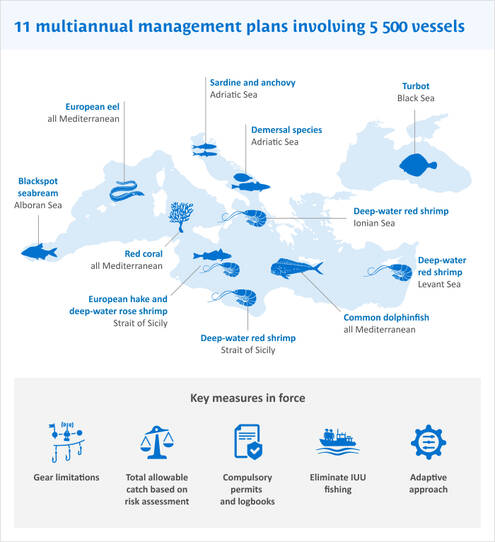Management plans
Multiannual management plans are essential tools for fisheries management. They guide the implementation of management measures towards the overall objectives of achieving and maintaining the sustainable exploitation of fishery resources, counteracting and preventing overfishing while ensuring high and long-term yields. This is typically accomplished through the establishment of specific objectives, indicators and reference points, such as attaining and maintaining maximum sustainable yield (MSY), as gauged against target levels (reference points) of fishing mortality and/or stock biomass. It is important that management plans are drafted on the basis of the precautionary approach and that they remain adaptable to changing stocks, fisheries and environments.
Multiannual management plans specify the agreed objectives for the fishery, the rules and regulations to be applied and other information that may be relevant to fisheries management. They include several management measures (e.g. spatio-temporal restrictions, effort and/or catch limitations, technical measures) and specify adaptive mechanisms to be implemented in order to achieve specific objectives within desired timeframes and maintain results over time, while allowing for changing and evolving stocks, fisheries and environments.
Since the creation of the first comprehensive GFCM multiannual management plan – for small pelagic fisheries in the Adriatic Sea in 2013 – the GFCM has adopted a total of 11 adaptive multiannual management plans. Nowadays, most GFCM multiannual management plans are implemented in a stepwise manner, foreseeing an initial transitional period (usually three years) involving the implementation of transitional measures in parallel with advances on scientific work, whose outcomes will comprise the basis for a second phase (usually five years) of implementing long-term adaptive measures. The GFCM has established a process to inform management plans, including the compilation of all background information and the definition of technical elements for management. If successful, this process results in the management plan being adopted as a binding recommendation at the GFCM session.

GFCM ACTIONS
- Work on technical elements to support the development of management plans: compilation of available scientific evidence useful for advice, identification of the potential scope and objectives, consultation with experts and national representatives on possible management measures.
- Implementation of research programmes to collect data necessary to inform management plans and formulation of advice for management plans based on agreed precautionary principles when information is scarce or fragmented.
- Performance of management strategy evaluation to inform multiannual management plans through the simulation of potential effects of alternative management scenarios, the determination of harvest control rules and/or the analysis of the effectiveness of management measures in place.
GFCM management plans and management measures in place
- Management Plan | Common dolphinfish fisheries in the Mediterranean Sea
- Management plan | Blackspot seabream in the Alboran Sea
- Management plan | Turbot fisheries in the Black Sea
- Management plan | Demersal fisheries in the Adriatic Sea
- Management plan | Deep-water red shrimp fisheries in the eastern-central Mediterranean
- Management plan | Small pelagic fisheries in the Adriatic Sea
- Management plan | European hake and deep-water rose shrimp bottom trawl fisheries in the Strait of Sicily
- Management plan | European eel in the Mediterranean Sea
- Management plan | Red coral in the Mediterranean Sea

